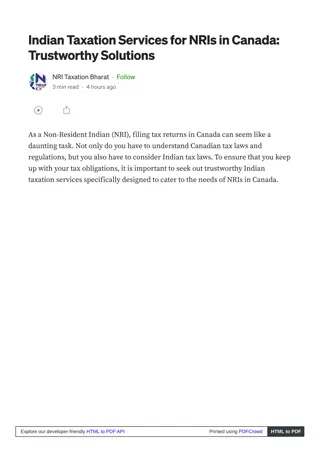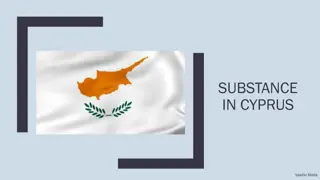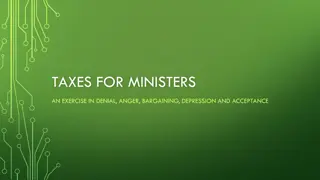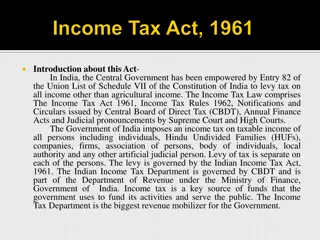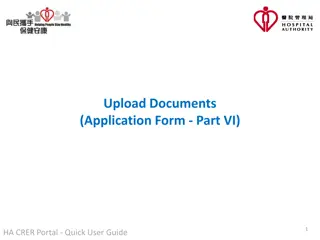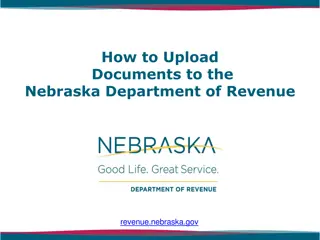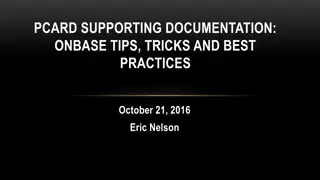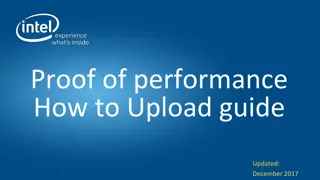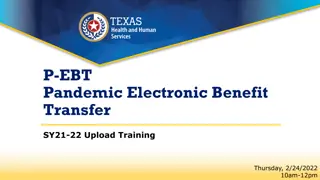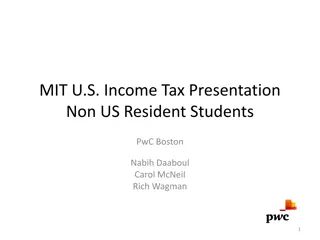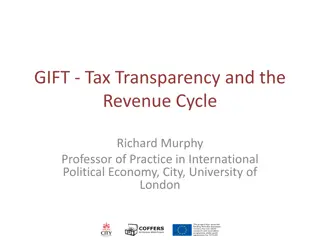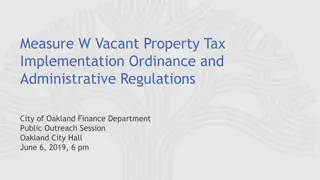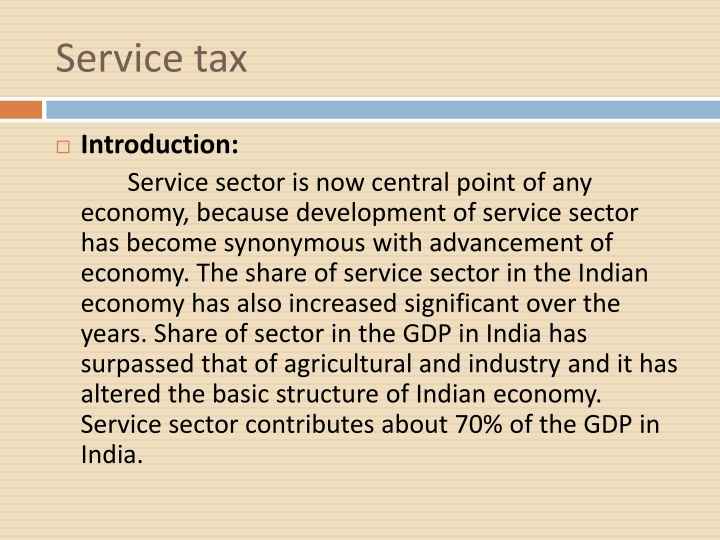
Evolution of Service Tax in India: A Comprehensive Overview
Explore the evolution and significance of service tax in India, its implementation, impact on the economy, and the reasons behind its introduction as a key revenue source for the government. Learn about the services taxed, the constitutional background, and the transition towards a more service-oriented economy.
Uploaded on | 1 Views
Download Presentation

Please find below an Image/Link to download the presentation.
The content on the website is provided AS IS for your information and personal use only. It may not be sold, licensed, or shared on other websites without obtaining consent from the author. If you encounter any issues during the download, it is possible that the publisher has removed the file from their server.
You are allowed to download the files provided on this website for personal or commercial use, subject to the condition that they are used lawfully. All files are the property of their respective owners.
The content on the website is provided AS IS for your information and personal use only. It may not be sold, licensed, or shared on other websites without obtaining consent from the author.
E N D
Presentation Transcript
Service tax Introduction: Service sector is now central point of any economy, because development of service sector has become synonymous with advancement of economy. The share of service sector in the Indian economy has also increased significant over the years. Share of sector in the GDP in India has surpassed that of agricultural and industry and it has altered the basic structure of Indian economy. Service sector contributes about 70% of the GDP in India.
Need of service tax? Fulfill the obligation of welfare state: In any welfare state, it is primary responsibility of the government to fulfill the increasing developmental needs of the country and its people and it has been done by way of public expenditure. India, being a developing economy, is striving to fulfill the obligation of a welfare state within its limited resources. The government s primary sources of revenue are direct and indirect tax. Central excise duties on the goods and manufactured and produce in India and customs duties on imported goods, constitute the two major sources of in direct tax in India, but revenue receipt from customs and excise duties are decline due to WTO commitments and rationalization on commodity duties.
To be Continue. Further, the most important factor warranting the levy of taxation on services was the need to evolve a coordinated system of domestic trade taxes at both, central and state level, as it has now been realized that consumption of services and goods for taxation purpose should be treated alike.
Service tax in India The tax reform committee headed by Dr. Raja J. Chelliah d the revenue potential of the service sector in India and recommended imposition of service tax on selected services. Based on these recommendations, Dr. Manmohan Singh (on that time was finance minister) in his budgets speech for the year 1994- 95 introduced the new concept of service tax and stated as under: There is no sound reason for exempting services from taxation, where goods are taxed and many countries treat goods and services alike for tax purposes. I, therefore, propose to make a modest effort in this direction by imposing the tax on services on telephones, non-life insurance and stock brokers .
To be continue. The introduction of service tax was under the residuary Entry of the constitution and as such, could not be brought through separate enactment; service tax was levied under chapter V of the Finance Act, 1994. It was introduce for the first time on following three services with a nominal rate of 5% advalorem. Telephone facility Stock brokers Non life insurance Subsequent finance Acts have added more and more services to be taxed for service tax purposes. As such today more than 115 services are chargeable to service tax.
Constitutional background According to article 265 of the constitution of India, no tax of any nature can be levied or collect by central or state government except by the Authority of law. The Authority to enact law and levy taxes and duties is given by the constitution vide article 246. According to article 246, law can be enacted by the parliament or state legislature, if such power is given by the constitution of India. As per seventh schedule of constitution of India, such power is given under the three lists; List-I- union list List-II- state list List- III- concurrent list There are various matters enumerated in each list, each matter in the list is known as an entry.
To be continue As regard the matter enumerated in the list I, the parliament has exclusive right to make law in the respect of that entry. On the other hand, as regard the matter enumerated in the list II, the legislature of any state has exclusive power to make law for such state or any part thereof with respect to such entry. In addition to above two lists, there is a third list that is called concurrent list. The parliament or the state legislature has power to make laws with respect to any matter enumerated in this list. Entry 97 of union list is the residuary entry and empowers to central government to levy tax on any matter, which not enumerated in list-I and list- II. In 1994 the service tax was levied by the central government in the power granted under the said entry 97 of Union list.
To be continue The government has also passed the constitution (88thAmendment Act), 2003 which provides for a formal levy of service tax by the central through the insertion of Article 268A to the constitution, which said that: Article- 268(1)- Tax on services shall be levied by the government of India and such tax shall be collected and appropriated by the Government of India and state in the manner prescribed in clause (2). Article- 268(2)- The proceeds in any financial year of any such tax levied in accordance with the provision of clause (1) shall be:- (a) Collected by Government of India and the state (b) Appropriated by the Government of India and the state. such principles of collection and appropriation subject to as may be formulated by the parliament by law.
To be continue. In addition to Article 268A, entry 92C has been inserted to list I in the seventh schedule. The said amendment Act however enables the states to collect and appropriate the proceeds of the levy. Thus, it is expected that separate service tax legislation will be enacted which will also pave the way for inclusion for the services within the purview of VAT. In fact, a draft service tax act has already been prepared for consideration by the parliament but the Government is now planning to move goods and services tax . Note- Although the Government has amended the Constitution and inserted entry no. 92C in the list-I of seventh schedule but no separate Act has been passed yet and service tax is still being governed by entry no. 97 i.e. residuary entry. Note- The tax was in place as per the specifications of the Finance Act, 1994. The tax, however, has been abolished since the roll-out of the Goods and Services tax (GST) on 01 July, 2017. The implementation of GST caused the fade-out of many other indirect taxes.
Meaning and Definition of service tax Definition: Service tax is a tax levied by the government on service providers on certain service transactions, but is actually borne by the customers. It is categorized under Indirect Tax and came into existence under the Finance Act, 1994. Description: In this case, the service provider pays the tax and recovers it from the customer. Service Tax was earlier levied on a specified list of services, but in the 2012 budget, its scope was increased. Services provided by air-conditioned restaurants and short term accommodation provided by hotels, inns, etc. were also included in the list of services. It is charged to the individual service providers on cash basis, and to companies on accrual basis. This tax is payable only when the value of services provided in a financial year is more than Rs 10 lakh. This tax is not applicable in the state of Jammu & Kashmir. Scope: It is leviable on taxable services provided or to be provided by a service provider. The services to be provided in future are taxed only if payment in its respect is received in advance.
Characteristics of service tax Two separate persons required and Payment to employees not covered: For charge of service tax, it is necessary that the service provider and service recipient should be two separate persons acting on principal to principal basis. Services provided by an employee to his employer are not covered service tax and, therefore, salaries or allowances paid to them cannot be charged to service tax. Free services not taxable: No service tax is leviable upon the services provided free of cost. Import/Export of services: While import of services is chargeable to tax u/s 66A, the export of services has been made exempt from tax. Performance of statutory activities/duties, not service : An activity performed by a sovereign /public authority under provisions of law does not constitute provision of taxable service to a person and, therefore, no service tax is leviable on such entities. Taxable services: Service tax is leviable only on the taxable services. Taxable services mean the services taxable under section 65(105) of the Finance Act, at time being.
To be continue. Value: For the levy of the service tax, the value shall be computed in accordance with section 67 read with Service Tax (Determination of Value) Rules, 2006. Payment of service tax: The person, who is the service provider has to pay service tax in such manner and within such period as is prescribed in the Service Tax Rules, 1994. The service tax is to be paid only on the receipt of payment towards the value of taxable services. Adding of more services: For the important notice of service tax is that, the Subsequent finance Acts have added more and more services to be taxed for service tax purposes. As such today more than 115 services are chargeable to service tax.
Different between service tax and professional tax: Professional tax is the tax levied and collected by the state governments in India. It is a indirect tax. Different states have different rates and methods of collection, while the Service Tax was a Tax that was levied by the Central Government of India on the certain services provided by service providers, this is also a indirect tax. Benefit benefit of professional is that the tax payer is eligible for income tax deduction for this payment, while on the payment of service tax this benefit is not available. As a Source of law - Applicability of Professional Tax based on as per Article 276 of the Constitution of India. While the provisions of Article 246, 265, and 268A of the Constitution of India with connection of entry 97 of union list and Section 65 of the Finance Act, 1994. are as a sources of law of service tax.
To be continue. Collecting authority- Professional tax is collected by the Commercial Tax Department. The commercial tax department of the respective states collects it which ultimately reaches the fund of Municipality Corporation. While service tax is collected by Central Board of Excise and Customs. Responsibility to pay of tax- The owner of a business is responsible to deduct professional tax from the salaries of his employees and this responsibility also lies on the Freelancing professional, employer of any profession calling living or manufactures. While in the matter of service tax this responsibility is lies on service providers. -----------------*-------------------*-------------------*------------------

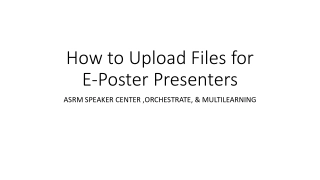

![Town of [Town Name] Real Estate Tax Rates and FY 2024 Budget Summary](/thumb/62211/town-of-town-name-real-estate-tax-rates-and-fy-2024-budget-summary.jpg)

